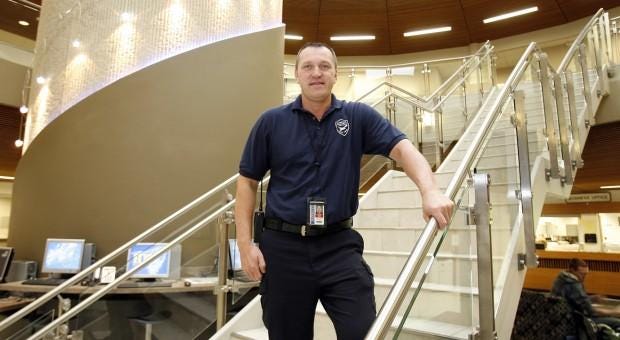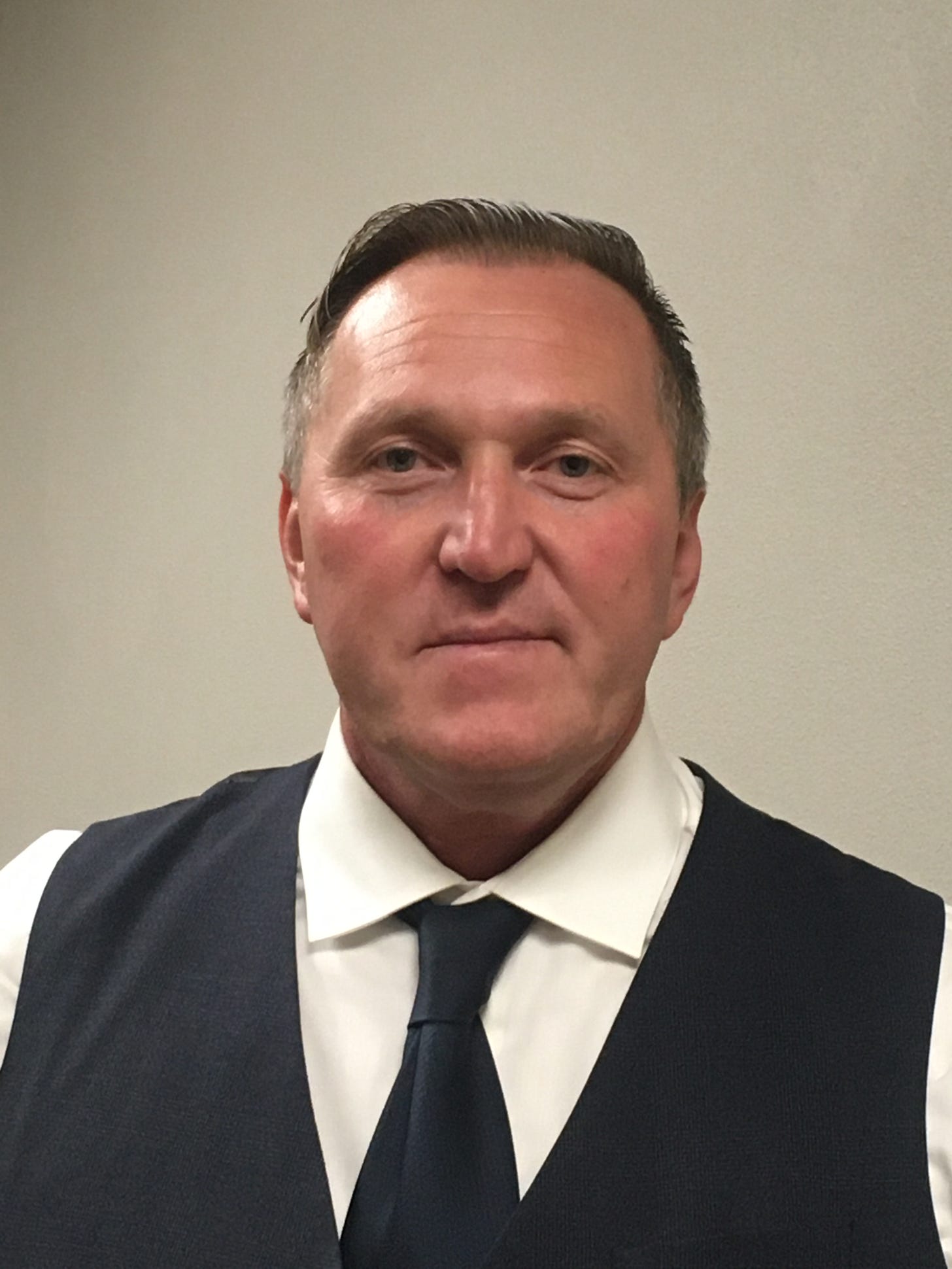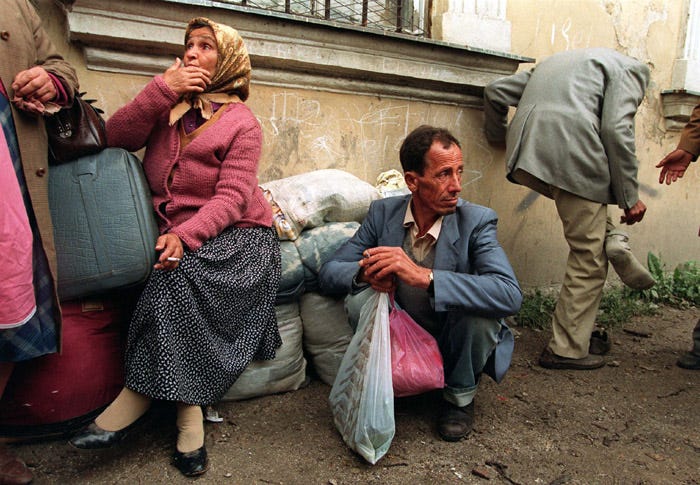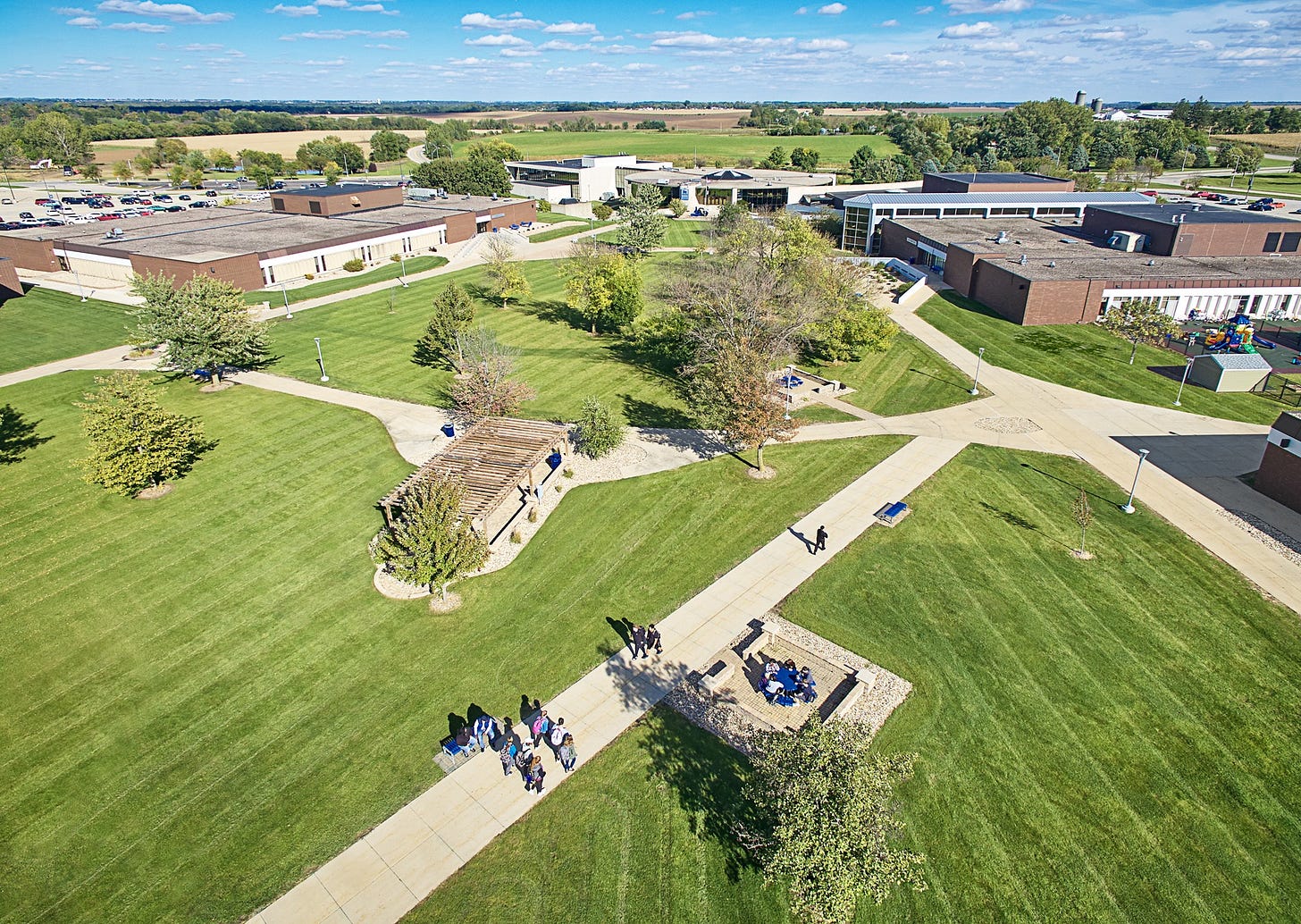Bosnian war vet keeps peace on Waterloo college campus
Nermin Ferkic marks 20 years as public safety director at Hawkeye Community College
WATERLOO-- Any native-born American could get a good lesson in citizenship from Nermin Ferkic.
He once barely knew English, cleaned floors for a living and rode a bicycle to college classes on the edge of town in the dead of winter.
His life may have seemed meager to many. It was a miracle to Ferkic. It was a new beginning, from which there was nowhere to go but up.
Ferkic became public safety director at Waterloo's Hawkeye Community College 20 years ago last month. To get to where he is now, he had to fight for some things many others take for granted -- as much as the air they breathe.
Peace. Freedom. And U.S. citizenship. The first two were in short supply where he came from, and for much of his adult life.
"I was born and raised in Bosnia, the former Yugoslavia, Bosnia-Herzegovina. I finished my high school there until the war tore us apart, Hence, my presence in this glorious state," he said.
Before the war, the land of his birth "was one of the most beautiful places I can recall," he said. "It's the most beautiful sense of social equality, social caring, that I have ever experienced in my life. People did not enjoy material wealth, but people took lots of pride in other human beings. We were very very social.
"It is absolutely amazing to even talk about it in present circumstances," he said. "Houses were never locked; you were more than welcome to walk into someone's house. We socialized a lot. if lunchtime came and you happened to be in a certain house that's where you had your lunch. Everyone knew that. It was just a huge unity of social life. It was absolutely amazing. We had this extreme, deep human connection. That's how I always remeber my country.”
Things changed with the civil war in the 1990s.
"That was the most diffcult thing that I have ever experienced in my whole life,” he said. “Everything about our country was about unity. You cannot judge people based on their religion; you cannot judge people based on their nationality. Everything was about equality. That's how we were brought up.
"And all of a sudden -- we're talking overnight - this is a humongous change. When segregation started happening. When religion started popping up. We understood we had Muslims, Greek Orthodox and Catholics. We understood that," and celebrated the different holidays. "But just overnight they wanted you to see these three entities as enemies.
"That's how the war started," Ferkic said. "They started creating hate -- where you're supposed to hate this human being just because they name their God a different name. It's very hard to process that.”
He was about 16 when the war started. It was "excruciatingly difficult and painful," he said. "Because you see these politicians making these statements and it goes against every grain of your being. It just does not make sense. You know these people as decent human beings," play companions while growing up, "and someone wants to paint them as monsters."
The situation devolved into a complicated series of regional conflicts. Ferkic was conscripted into the army at 18. He was in combat.
"It is one of the most horrifiic things that a human being can go through,” he said. “It is my opinion that 90 percent of the people in war do not want to fight. People don't want to have blood on their hands, firing that rifle. You go because the situation dictates you to. You see nothing but hate. It's constant worrying: ‘Are you gonna die? Will my mom lose me?’ "
He went to the funeral of a friend killed in battle. He still recalls the scene. "I can see this woman kneeling in front of her son before he's buried and ripping the hair out of her head.
"Things that happen in war never leave you; they will stay in your sight for the rest of your life," Ferkic said. "Any person who ever said they've been in a war and they are fine is lying, or that person as a superior human being.
"War is nothing but constant fear. 'Will I step on a land mine? Will a sniper shoot me? Will I have a chance to say goodbye?’ “ he said. “It's a constant stress, a constant pressure, you have on your brain. It creates a drive to survive.
"You see image after image. And we were children,” Ferkic said. “Look around and see our 18- and 19-year-old kids and tell me they are adults. Imagine our kids seeing the horror of humanity that will never be seen in peacetime. That changes you forever. PTSD engraves into your psyche. They damage you, they ruin you, for the rest of your life. When you walk into that war, you will never be normal again. It is one of the most horrific things humans have invented."

Civil war pits friend against friend "They sometimes see you through the sniper's scope and call your name, and that's the person you grew up with,” Ferkic said. “Lots of forgiveness has happened -- where you know they could have chosen to take your life but they chose not to. People don't want to fight wars. I have never in my life pulled the trigger other than when I absolutely had to -- where it’s for survival.
"I hate to use this word, but the only way to describe what is happened with us is rape. They literally rape your soul,” he said. “They don't allow you to have choice. They tell you when to sleep, eat, go to the bathroom. And they tell you when you're going to die. You have zero choices. It engraved a constant fear into my soul: to lose choice. I don't care what environment you put me in, but if you take ever take my choice away from me, I literally don't want to live.
"We lost the war and were sent into the refugee camps,” Ferkic said. “That's the first time where you had a glint, an ounce, of a hope that you had choice. You could endure all the hardship of the refugee camps — all the hate they throw at you, living in mud sleeping in mud, 200-300 calories a day — you could endure all that with a glimpse of a hope that some other country will find mercy and take you.
"That's where I took a stand that I'm gonna leave this country or I'm gonna die," Ferkic said. "I had zero desire to go back. I was so tired of war, hate, killing. I was hitting 20 yeas old. All I'd experienced was hate and war and discrimination.

"We stood for a year in a horrible conditions," he said, until granted refugee status and sent to a registered refugee camp and a chance to go to a new country,
"I wanted the United States of America because they said to us, 'Once you to go the United States, you get what your earn.' “ Ferkic said. “That concept is a utopia in our mind. It is very difficult for so many people who were not in my shoes to understand how much that meant to me. I did not want to hear about any other country, I did not want to go anywhere else but the United States, because they had that concept. You will be able too work, and create your own life.
"I didn't believe that. I thought 'This is too good to be true,’ " Ferkic said. "The idea that I can work 40 hours a week and the rest of my time is my own is impossible to accept, “ despite the training and preparations for his new life in the refugee camps. “I believed that they were dangling a carrot."he said. And he felt unworthy of such a life, even if it existed.
"But the trip to the United States itself, the feelings of being accepted, are as equivalent as a citizen of this country learning they've won a $100 million lottery” and too good to be true.
”I'm always thinking that something will happen to me: I'll be pulled off the plane because they changed their mind," Ferkic said, or that some accident might befall him. "That I'm actually not worthy of this.
"But when we landed in Waterloo, Iowa, when I put my feet on the (tarmac) floor, that is one of the most powerful feelings I've ever had," he said. "I have always known that one of the most powerful feelings human beings can have is hope. If you have hope, nothing can touch you. You all of a sudden have a mother, a homeland a place were we will protect you. This is really happening. They're not going to take this away from me. Nobody's going to tap me on the shoulder. The sense of happiness, the sense of power, never were more powerful than at that moment. You have landed in the country of your dreams and you have the whole world right in front of you.

"Now," he said, "if somebody would look at my life at that moment, they would say, 'This man has lost his mind.' " He found a modest apartment and a job within walking distance as a custodian at Covenant Medical Center, now MercyOne Waterloo. "I was living in an apartment that doesn't have anything, just four walls," He bought frozen pizza at a nearby discount grocery store and broke it in pieces before cooking "because I didn't have utensils." He also bought a heavy old black and white television for $10 at a nearby garage sale, and received one channel over the air.
"But I had a job where I worked and got paid for it," he said. "The sense of peace, of happiness, is something that's difficult to describe. Somebody from outside would look at that and say, 'This is my definition of hell. Poor man. He goes and cleans bathrooms all day and comes home to an empty apartment and a black and white TV. Why is he smiling?’ But to me, that was the biggest happiness ever."
Waterloo received approximately 3,000 Bosnian refugees between 1996 and 1999. Ferkic came directly to Waterloo because he had a cousin living here.
"I love every ounce of it,” he said of the community. “It was a difficult transition because the biggest cultural shock is that people are always smiling. They were happy. For us, to smile, It would have to be something big and powerful. And you don't smile much. But when I came to Waterloo, people were very very pleasant. They were kind. They were accommodating. And they were smiling.

”It took me a while to make eye contact,” he said “I looked at the ground and walked by, because I was afraid I might offend someone. But as you start interacting with people and start learning language, you just realize these are just absolutely decent human beings. It was so heartwarming that they cared about you that much.
"It is an absolute blessing I landed in a small town," Ferkic said. "They don't know how much that meant to us. A simple smile, or a simple welcome, or a tap on the shoulder. That is priceless. And I will die paying back the people of Waterloo. They were they most kind and accommodating people that can be."
At work at the hospital, he said, "Every single day I felt like I was their child. They were so invested in me, that I understand they're there to help me," with questions, or transportation. "You cannot imagine how much that meant, when you have someone to whom you can go and ask the most embarrassing questions there are. That's how they accepted me. Nicest people ever."
There were challenges. "An extreme amount of obstacles," Ferkic said. "The biggest problem of all problems is the language." He recalled, early on in his job as a custodian, he misinterpreted a supervisor's directions to spot-clean a carpet. Instead, he cleaned the entire floor, wall to wall, with a small portable machine.
"He came back an hour after my shift to see me finishing my floor. I was covered in sweat; my knees were bleeding because I was kneeling down. He realized I'd cleaned that whole floor with one portable machine. Of course he felt terrible."
Ferkic misunderstood his supervisor’s reaction as anger directed at him. "I bowed my head. I was leaving and he was running after me to explain he was not angry at me, he was angry at himself.
"I realized to survive I would have to learn the language,” Ferkic said, and his technique became an object of curiosity with the other hospital staff.
"I would take 100-150 words out of a dictionary and would write them down. When I was buffing the floor with the big buffer, I would put the note on the big buffer" he said. He would learn and recite the words to himself in time to the sweep of the buffer. By the end of his lesson during cleaning, “I would have the words memorized.
”People were so confused,” he said. “One time I was working on the second floor and looked up and there were the heads of the entire surgical team, looking at me and trying to figure out, 'What is he doing? What is whispering?' One of them asked me. I said, 'I'm learning words, see?' They were so impressed with that. Once you learn the language, a lot of the barriers go away."
But Ferkic also noted, "There are an extreme amount of differences in our cultures." Differences in demeanor can be misinterpreted as rudeness, or slights, or being too intruisive. For example he said, Bosnians are big on hugging.
"I've done hundreds of workshops for people, begging and pleading, if you are dealing with someone not born in this country, all I'm asking is, before you develop a judgment or before you say something, ask why. Just ask, 'Why did you do that?' When they provide an explanation, you will realize this doesn't have anything to do with you, they did not mean to offend you, this is just how you were raised."
While still living near the hospital, Ferkic got a bicycle and decided to attend classes at Hawkeye Community College. "I had no idea what anybody was saying. My English was so limited," he said. "I took classes without speaking any English at all. My biggest fear was if they asked me a question,” But he said, by attending class, “that's how I learned the language.
One of his teachers jumped to conclusions.
"One professor was very agitated and found me disrespectful,” Ferkic said. “When I asked him why, he said, " 'Well, when you come to my class, you just put your hands in your pockets and sit there without taking a single note.'
”I said, 'I'm memorizing what you're saying. My problem is I ride my bicycle seven miles and it's wintertime; it's cold. So when I come here, I can't feel my hands,’ “ Ferkic said. “ ‘I can't write. So I put my hands in my pockets to get warm so I can start getting feeling back.'
The professor ”felt so bad he started crying,” Ferkic said. “I didn't mean to do that to him. He felt awful for passing judgment on someone who's riding a bike in winter in Iowa to come to college."
He worked hard through the painstaking naturalization process to get his citizenship as soon as possible. Taking the citizenship oath was one of the proudest moments of his life
"You are a citizen of the United States of America. You are part of something so great," he said.
He felt blessed. And he felt a calling.
"I felt that what I when through and survived, I felt an obligation. I felt some higher power saved me to say, 'You need to pay back. You need to help other people how you were helped.’ "
Consequently, he said, "I chose police science. I wanted to help as many people as I could." Even though that may be contrary to how some civilians view law enforcement, he said, "I never saw a police officer job to be, 'I have a fancy uniform, I have dark sunglasses, people fear me, I have a fancy car and I'm cool.' Never have I seen cops as that way. What I see is, this is your opportunity where hundreds, thousands of people can call on you when they're in trouble and you can help them out.
”I don't think anything on this planet can be more rewarding,” he said. “I know what pain is, I know what suffering is, and I have an opportunity to help some people with that."
He obtained a degree at Hawkeye, a bachelor's degree in criminology from the University of Northern Iowa, where he eventually became an officer for UNI campus security. He then obtained master's degree in communications.
One of his goals, to join the FBI, didn't happen when he could not pass a hearing test. But when that door closed another opened -- his current position as public safety director at HCC.
His job is to "create a safe and comfortable environment" for students, faculty and staff. Ferkic practices what many term "community policing" today -- using his training and communications skills to defuse situations and to keep an open environment and offer solutions to those who feel aggrieved. Arrest is a last resort, not the first.

"I'm extraordinarily good at what I do. It's called verbal judo. I'm very very good at it," he said, because of his training, and the situation he came from.
"I understand violence. I understand anger. I understand feelings. And I know what to say, when to say it, and how to say it. It just reaches into their soul, just like that."
He wrote his thesis 15 years ago on the importance of public relations in law enforcement agencies. It was "spot on with everything that's happening with this country right now,” he said. “Police officers are way underpaid, way overworked. You expect them to go out on the street and be psychologists," and officers need a balance of training in communications a well as judicious use of force.
"It's difficult for people to understand, but rarely will you ever come across a bad person," Ferkic said. "There are bad people, I understand that. There are not many bad people in this world. If there are people we consider bad, it's because we don't understand them. Everybody has problems. Just because you've done something disorderly, shown your ugly side, doesn't mean that's who you are. I never allow an action to define a human being to me. It's an isolated incident."
For example, Ferkic recently took time to talk to an agitated and violently disruptive student and give him a chance to explain his frustrations — some of which stemmed from his situation at home. He told the student to take a day for himself, come back and apologize to those he acted out against and get on with his life.
"Instead of having him arrested, expelled, I gave him a chance to do better. He did," Ferkic said. "If we don't help each other, how are we going to have a successful community?
”That's why I love this place,” he said of HCC. “This is one of the most amazing places," particularly with the Waterloo-Cedar Falls metro area's increasingly diverse population, as reflected in the HCC student body.
"We have people from all over the world, all different walks, people who want to make something out of themselves," Ferkic said. "When I seen them, I see myself, sitting in that classroom with frozen hands.”
Pat Kinney is a freelance writer and former longtime news staffer with the Waterloo-Cedar Falls Courier and, prior to that, several years at the Ames Tribune. He is currently an oral historian with the Grout Museum District in Waterloo. His “View from the Cedar Valley” column is part of “Iowa Writers Collaborative,” a collection of news and opinion writers from around the state who previously and currently work with a host of Iowa newspapers, news organizations and other publications. They are listed below. Clink on the links to check them out, subscribe for free - and, if you believe in the value of quality journalism, support this column and/or any of theirs with a paid subscription .
The Iowa Writers’ Collaborative







Great story!